TLAW 401 Business Law: Examining Essential Elements of a Contract
VerifiedAdded on 2023/06/07
|6
|1900
|234
Report
AI Summary
This assignment delves into the essential elements of contract law, focusing on a scenario involving Sunita and her uncle, Mr. Property-Walla. It examines whether a valid contract exists between them regarding a shop space. The analysis covers key elements such as offer, acceptance, legal intention, and consideration, referencing relevant case laws like Carlill v Carbolic Smoke Ball Co and Balfour v Balfour. The report also explores the application of promissory estoppel, arguing that Sunita can compel her uncle to honor his promise due to her reliance on it and subsequent actions taken. Ultimately, the assignment concludes that a valid contract exists and Sunita has legal recourse based on promissory estoppel.
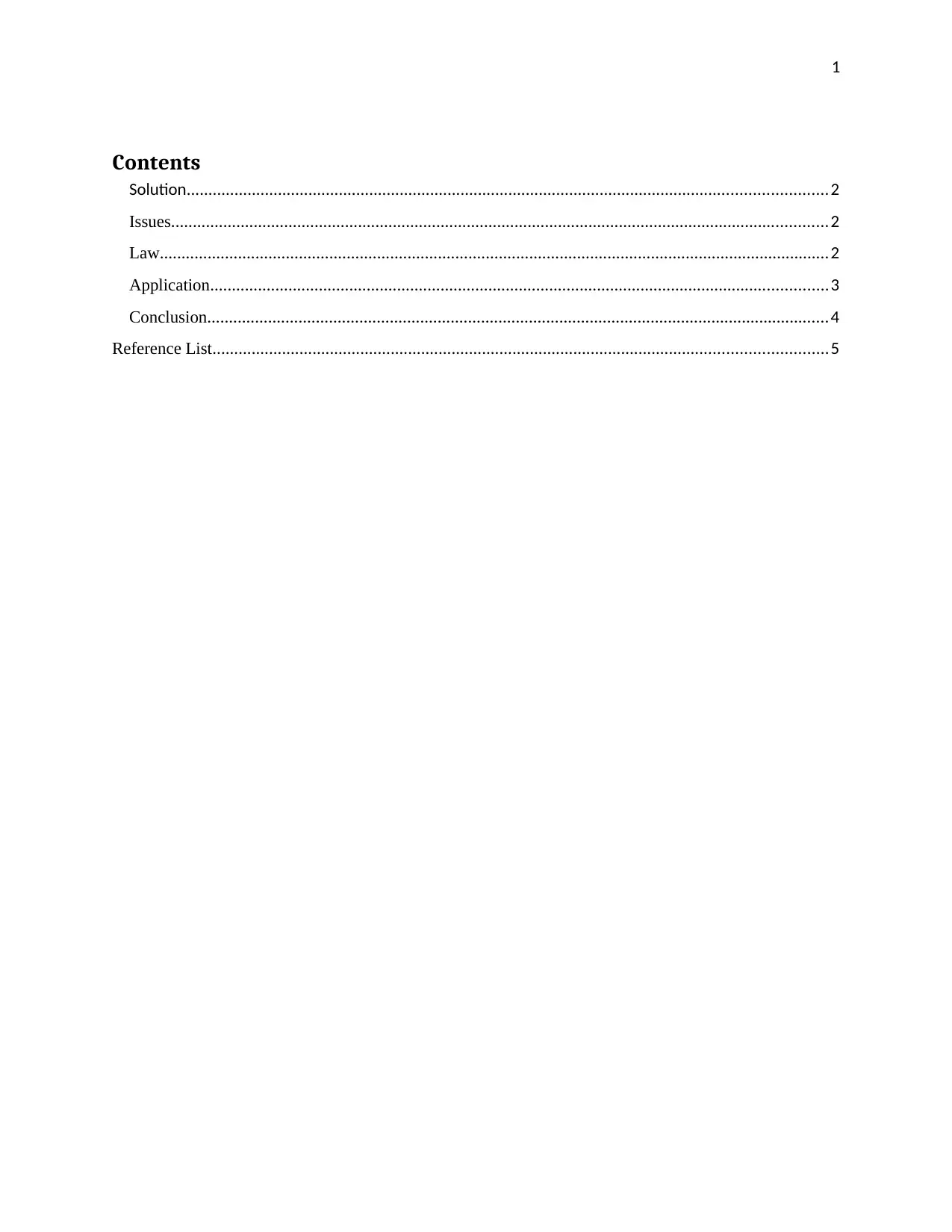
1
Contents
Solution...................................................................................................................................................2
Issues.......................................................................................................................................................2
Law..........................................................................................................................................................2
Application..............................................................................................................................................3
Conclusion...............................................................................................................................................4
Reference List.............................................................................................................................................5
Contents
Solution...................................................................................................................................................2
Issues.......................................................................................................................................................2
Law..........................................................................................................................................................2
Application..............................................................................................................................................3
Conclusion...............................................................................................................................................4
Reference List.............................................................................................................................................5
Paraphrase This Document
Need a fresh take? Get an instant paraphrase of this document with our AI Paraphraser
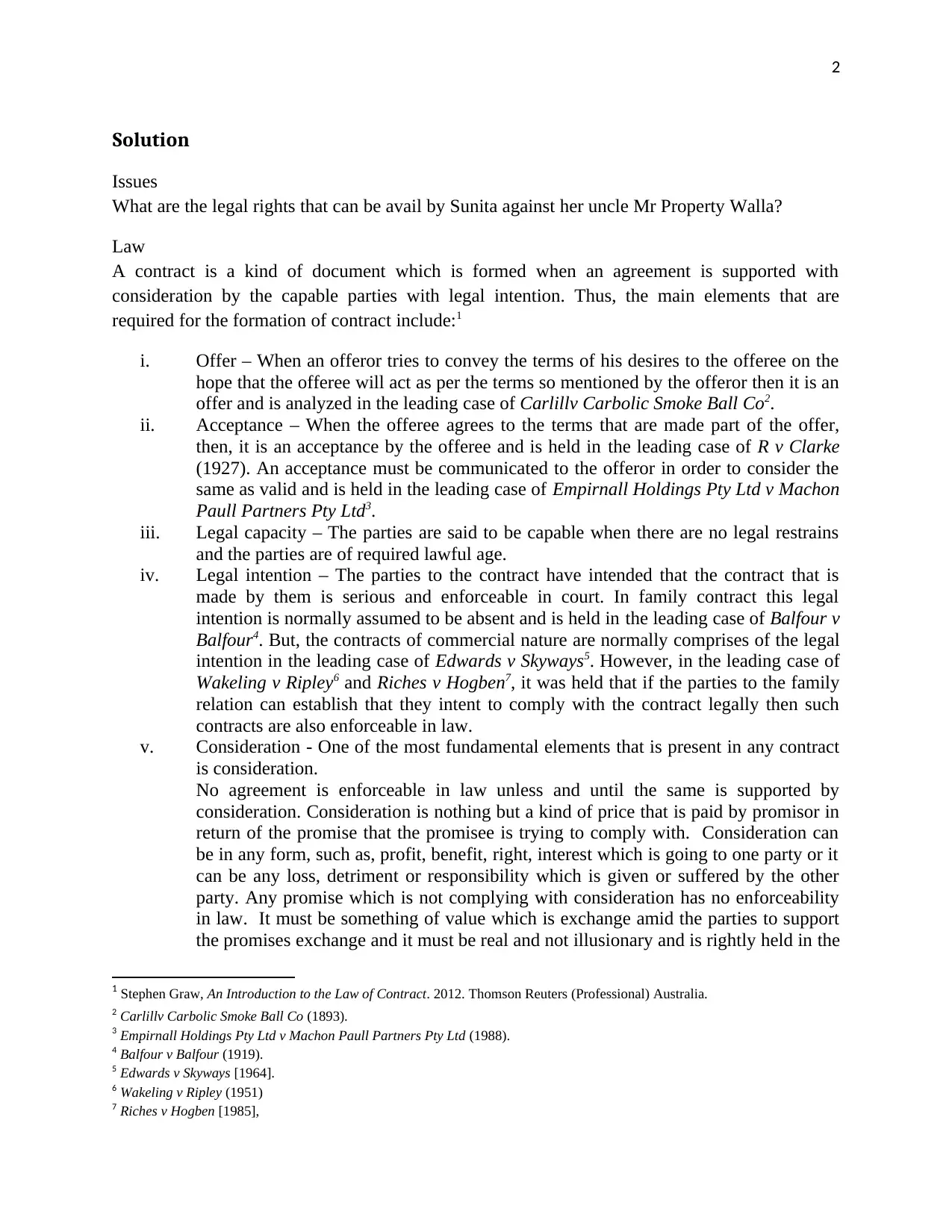
2
Solution
Issues
What are the legal rights that can be avail by Sunita against her uncle Mr Property Walla?
Law
A contract is a kind of document which is formed when an agreement is supported with
consideration by the capable parties with legal intention. Thus, the main elements that are
required for the formation of contract include:1
i. Offer – When an offeror tries to convey the terms of his desires to the offeree on the
hope that the offeree will act as per the terms so mentioned by the offeror then it is an
offer and is analyzed in the leading case of Carlillv Carbolic Smoke Ball Co2.
ii. Acceptance – When the offeree agrees to the terms that are made part of the offer,
then, it is an acceptance by the offeree and is held in the leading case of R v Clarke
(1927). An acceptance must be communicated to the offeror in order to consider the
same as valid and is held in the leading case of Empirnall Holdings Pty Ltd v Machon
Paull Partners Pty Ltd3.
iii. Legal capacity – The parties are said to be capable when there are no legal restrains
and the parties are of required lawful age.
iv. Legal intention – The parties to the contract have intended that the contract that is
made by them is serious and enforceable in court. In family contract this legal
intention is normally assumed to be absent and is held in the leading case of Balfour v
Balfour4. But, the contracts of commercial nature are normally comprises of the legal
intention in the leading case of Edwards v Skyways5. However, in the leading case of
Wakeling v Ripley6 and Riches v Hogben7, it was held that if the parties to the family
relation can establish that they intent to comply with the contract legally then such
contracts are also enforceable in law.
v. Consideration - One of the most fundamental elements that is present in any contract
is consideration.
No agreement is enforceable in law unless and until the same is supported by
consideration. Consideration is nothing but a kind of price that is paid by promisor in
return of the promise that the promisee is trying to comply with. Consideration can
be in any form, such as, profit, benefit, right, interest which is going to one party or it
can be any loss, detriment or responsibility which is given or suffered by the other
party. Any promise which is not complying with consideration has no enforceability
in law. It must be something of value which is exchange amid the parties to support
the promises exchange and it must be real and not illusionary and is rightly held in the
1 Stephen Graw, An Introduction to the Law of Contract. 2012. Thomson Reuters (Professional) Australia.
2 Carlillv Carbolic Smoke Ball Co (1893).
3 Empirnall Holdings Pty Ltd v Machon Paull Partners Pty Ltd (1988).
4 Balfour v Balfour (1919).
5 Edwards v Skyways [1964].
6 Wakeling v Ripley (1951)
7 Riches v Hogben [1985],
Solution
Issues
What are the legal rights that can be avail by Sunita against her uncle Mr Property Walla?
Law
A contract is a kind of document which is formed when an agreement is supported with
consideration by the capable parties with legal intention. Thus, the main elements that are
required for the formation of contract include:1
i. Offer – When an offeror tries to convey the terms of his desires to the offeree on the
hope that the offeree will act as per the terms so mentioned by the offeror then it is an
offer and is analyzed in the leading case of Carlillv Carbolic Smoke Ball Co2.
ii. Acceptance – When the offeree agrees to the terms that are made part of the offer,
then, it is an acceptance by the offeree and is held in the leading case of R v Clarke
(1927). An acceptance must be communicated to the offeror in order to consider the
same as valid and is held in the leading case of Empirnall Holdings Pty Ltd v Machon
Paull Partners Pty Ltd3.
iii. Legal capacity – The parties are said to be capable when there are no legal restrains
and the parties are of required lawful age.
iv. Legal intention – The parties to the contract have intended that the contract that is
made by them is serious and enforceable in court. In family contract this legal
intention is normally assumed to be absent and is held in the leading case of Balfour v
Balfour4. But, the contracts of commercial nature are normally comprises of the legal
intention in the leading case of Edwards v Skyways5. However, in the leading case of
Wakeling v Ripley6 and Riches v Hogben7, it was held that if the parties to the family
relation can establish that they intent to comply with the contract legally then such
contracts are also enforceable in law.
v. Consideration - One of the most fundamental elements that is present in any contract
is consideration.
No agreement is enforceable in law unless and until the same is supported by
consideration. Consideration is nothing but a kind of price that is paid by promisor in
return of the promise that the promisee is trying to comply with. Consideration can
be in any form, such as, profit, benefit, right, interest which is going to one party or it
can be any loss, detriment or responsibility which is given or suffered by the other
party. Any promise which is not complying with consideration has no enforceability
in law. It must be something of value which is exchange amid the parties to support
the promises exchange and it must be real and not illusionary and is rightly held in the
1 Stephen Graw, An Introduction to the Law of Contract. 2012. Thomson Reuters (Professional) Australia.
2 Carlillv Carbolic Smoke Ball Co (1893).
3 Empirnall Holdings Pty Ltd v Machon Paull Partners Pty Ltd (1988).
4 Balfour v Balfour (1919).
5 Edwards v Skyways [1964].
6 Wakeling v Ripley (1951)
7 Riches v Hogben [1985],
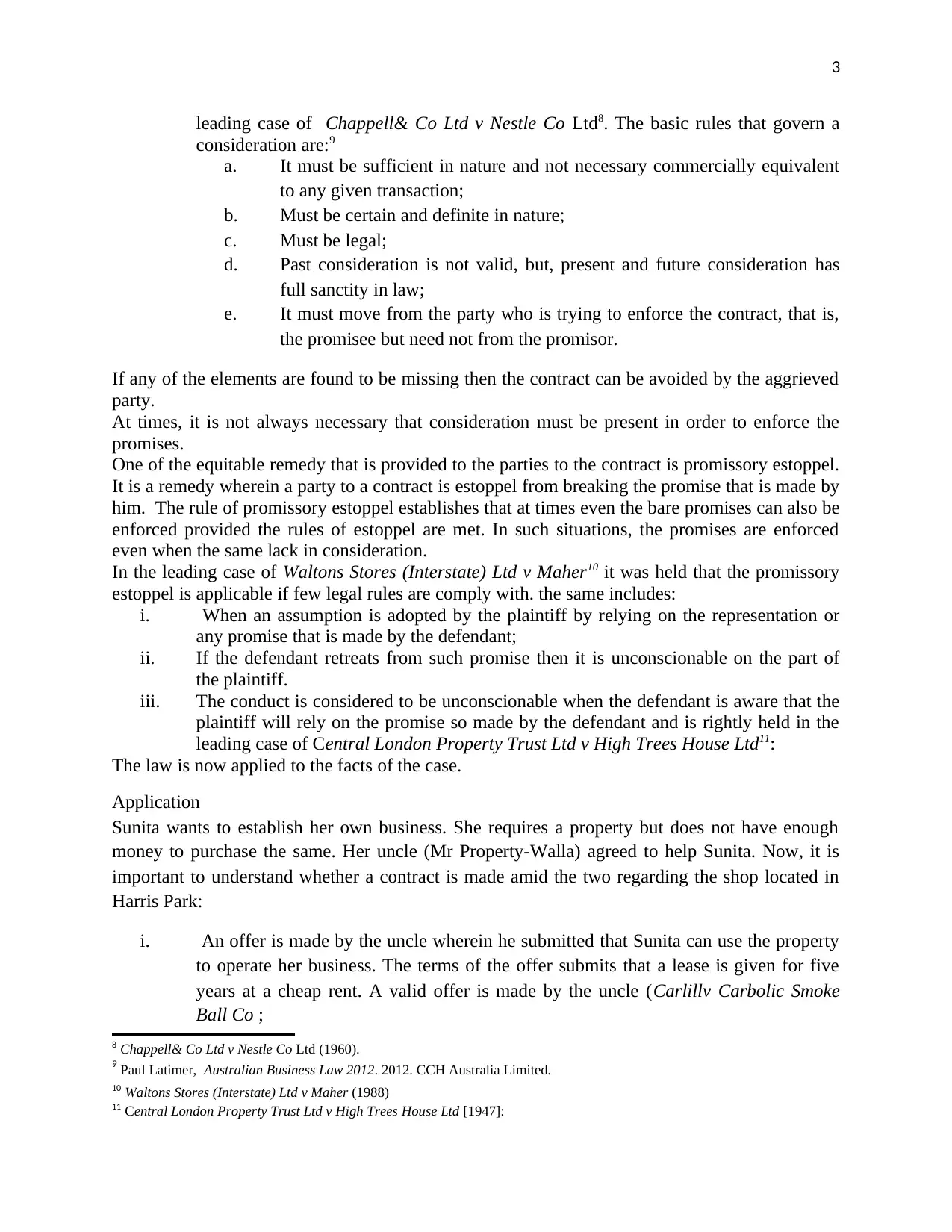
3
leading case of Chappell& Co Ltd v Nestle Co Ltd8. The basic rules that govern a
consideration are:9
a. It must be sufficient in nature and not necessary commercially equivalent
to any given transaction;
b. Must be certain and definite in nature;
c. Must be legal;
d. Past consideration is not valid, but, present and future consideration has
full sanctity in law;
e. It must move from the party who is trying to enforce the contract, that is,
the promisee but need not from the promisor.
If any of the elements are found to be missing then the contract can be avoided by the aggrieved
party.
At times, it is not always necessary that consideration must be present in order to enforce the
promises.
One of the equitable remedy that is provided to the parties to the contract is promissory estoppel.
It is a remedy wherein a party to a contract is estoppel from breaking the promise that is made by
him. The rule of promissory estoppel establishes that at times even the bare promises can also be
enforced provided the rules of estoppel are met. In such situations, the promises are enforced
even when the same lack in consideration.
In the leading case of Waltons Stores (Interstate) Ltd v Maher10 it was held that the promissory
estoppel is applicable if few legal rules are comply with. the same includes:
i. When an assumption is adopted by the plaintiff by relying on the representation or
any promise that is made by the defendant;
ii. If the defendant retreats from such promise then it is unconscionable on the part of
the plaintiff.
iii. The conduct is considered to be unconscionable when the defendant is aware that the
plaintiff will rely on the promise so made by the defendant and is rightly held in the
leading case of Central London Property Trust Ltd v High Trees House Ltd11:
The law is now applied to the facts of the case.
Application
Sunita wants to establish her own business. She requires a property but does not have enough
money to purchase the same. Her uncle (Mr Property-Walla) agreed to help Sunita. Now, it is
important to understand whether a contract is made amid the two regarding the shop located in
Harris Park:
i. An offer is made by the uncle wherein he submitted that Sunita can use the property
to operate her business. The terms of the offer submits that a lease is given for five
years at a cheap rent. A valid offer is made by the uncle (Carlillv Carbolic Smoke
Ball Co ;
8 Chappell& Co Ltd v Nestle Co Ltd (1960).
9 Paul Latimer, Australian Business Law 2012. 2012. CCH Australia Limited.
10 Waltons Stores (Interstate) Ltd v Maher (1988)
11 Central London Property Trust Ltd v High Trees House Ltd [1947]:
leading case of Chappell& Co Ltd v Nestle Co Ltd8. The basic rules that govern a
consideration are:9
a. It must be sufficient in nature and not necessary commercially equivalent
to any given transaction;
b. Must be certain and definite in nature;
c. Must be legal;
d. Past consideration is not valid, but, present and future consideration has
full sanctity in law;
e. It must move from the party who is trying to enforce the contract, that is,
the promisee but need not from the promisor.
If any of the elements are found to be missing then the contract can be avoided by the aggrieved
party.
At times, it is not always necessary that consideration must be present in order to enforce the
promises.
One of the equitable remedy that is provided to the parties to the contract is promissory estoppel.
It is a remedy wherein a party to a contract is estoppel from breaking the promise that is made by
him. The rule of promissory estoppel establishes that at times even the bare promises can also be
enforced provided the rules of estoppel are met. In such situations, the promises are enforced
even when the same lack in consideration.
In the leading case of Waltons Stores (Interstate) Ltd v Maher10 it was held that the promissory
estoppel is applicable if few legal rules are comply with. the same includes:
i. When an assumption is adopted by the plaintiff by relying on the representation or
any promise that is made by the defendant;
ii. If the defendant retreats from such promise then it is unconscionable on the part of
the plaintiff.
iii. The conduct is considered to be unconscionable when the defendant is aware that the
plaintiff will rely on the promise so made by the defendant and is rightly held in the
leading case of Central London Property Trust Ltd v High Trees House Ltd11:
The law is now applied to the facts of the case.
Application
Sunita wants to establish her own business. She requires a property but does not have enough
money to purchase the same. Her uncle (Mr Property-Walla) agreed to help Sunita. Now, it is
important to understand whether a contract is made amid the two regarding the shop located in
Harris Park:
i. An offer is made by the uncle wherein he submitted that Sunita can use the property
to operate her business. The terms of the offer submits that a lease is given for five
years at a cheap rent. A valid offer is made by the uncle (Carlillv Carbolic Smoke
Ball Co ;
8 Chappell& Co Ltd v Nestle Co Ltd (1960).
9 Paul Latimer, Australian Business Law 2012. 2012. CCH Australia Limited.
10 Waltons Stores (Interstate) Ltd v Maher (1988)
11 Central London Property Trust Ltd v High Trees House Ltd [1947]:
⊘ This is a preview!⊘
Do you want full access?
Subscribe today to unlock all pages.

Trusted by 1+ million students worldwide
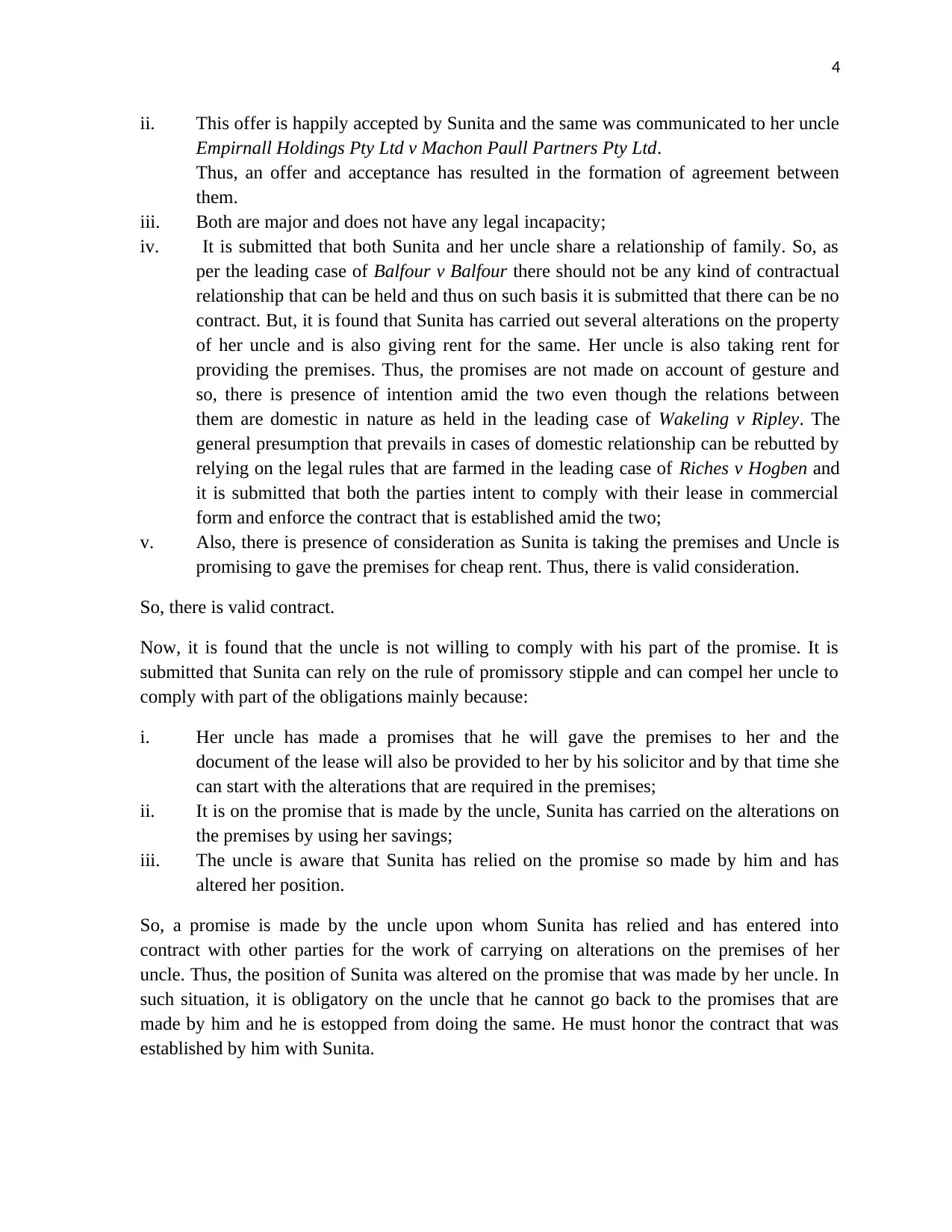
4
ii. This offer is happily accepted by Sunita and the same was communicated to her uncle
Empirnall Holdings Pty Ltd v Machon Paull Partners Pty Ltd.
Thus, an offer and acceptance has resulted in the formation of agreement between
them.
iii. Both are major and does not have any legal incapacity;
iv. It is submitted that both Sunita and her uncle share a relationship of family. So, as
per the leading case of Balfour v Balfour there should not be any kind of contractual
relationship that can be held and thus on such basis it is submitted that there can be no
contract. But, it is found that Sunita has carried out several alterations on the property
of her uncle and is also giving rent for the same. Her uncle is also taking rent for
providing the premises. Thus, the promises are not made on account of gesture and
so, there is presence of intention amid the two even though the relations between
them are domestic in nature as held in the leading case of Wakeling v Ripley. The
general presumption that prevails in cases of domestic relationship can be rebutted by
relying on the legal rules that are farmed in the leading case of Riches v Hogben and
it is submitted that both the parties intent to comply with their lease in commercial
form and enforce the contract that is established amid the two;
v. Also, there is presence of consideration as Sunita is taking the premises and Uncle is
promising to gave the premises for cheap rent. Thus, there is valid consideration.
So, there is valid contract.
Now, it is found that the uncle is not willing to comply with his part of the promise. It is
submitted that Sunita can rely on the rule of promissory stipple and can compel her uncle to
comply with part of the obligations mainly because:
i. Her uncle has made a promises that he will gave the premises to her and the
document of the lease will also be provided to her by his solicitor and by that time she
can start with the alterations that are required in the premises;
ii. It is on the promise that is made by the uncle, Sunita has carried on the alterations on
the premises by using her savings;
iii. The uncle is aware that Sunita has relied on the promise so made by him and has
altered her position.
So, a promise is made by the uncle upon whom Sunita has relied and has entered into
contract with other parties for the work of carrying on alterations on the premises of her
uncle. Thus, the position of Sunita was altered on the promise that was made by her uncle. In
such situation, it is obligatory on the uncle that he cannot go back to the promises that are
made by him and he is estopped from doing the same. He must honor the contract that was
established by him with Sunita.
ii. This offer is happily accepted by Sunita and the same was communicated to her uncle
Empirnall Holdings Pty Ltd v Machon Paull Partners Pty Ltd.
Thus, an offer and acceptance has resulted in the formation of agreement between
them.
iii. Both are major and does not have any legal incapacity;
iv. It is submitted that both Sunita and her uncle share a relationship of family. So, as
per the leading case of Balfour v Balfour there should not be any kind of contractual
relationship that can be held and thus on such basis it is submitted that there can be no
contract. But, it is found that Sunita has carried out several alterations on the property
of her uncle and is also giving rent for the same. Her uncle is also taking rent for
providing the premises. Thus, the promises are not made on account of gesture and
so, there is presence of intention amid the two even though the relations between
them are domestic in nature as held in the leading case of Wakeling v Ripley. The
general presumption that prevails in cases of domestic relationship can be rebutted by
relying on the legal rules that are farmed in the leading case of Riches v Hogben and
it is submitted that both the parties intent to comply with their lease in commercial
form and enforce the contract that is established amid the two;
v. Also, there is presence of consideration as Sunita is taking the premises and Uncle is
promising to gave the premises for cheap rent. Thus, there is valid consideration.
So, there is valid contract.
Now, it is found that the uncle is not willing to comply with his part of the promise. It is
submitted that Sunita can rely on the rule of promissory stipple and can compel her uncle to
comply with part of the obligations mainly because:
i. Her uncle has made a promises that he will gave the premises to her and the
document of the lease will also be provided to her by his solicitor and by that time she
can start with the alterations that are required in the premises;
ii. It is on the promise that is made by the uncle, Sunita has carried on the alterations on
the premises by using her savings;
iii. The uncle is aware that Sunita has relied on the promise so made by him and has
altered her position.
So, a promise is made by the uncle upon whom Sunita has relied and has entered into
contract with other parties for the work of carrying on alterations on the premises of her
uncle. Thus, the position of Sunita was altered on the promise that was made by her uncle. In
such situation, it is obligatory on the uncle that he cannot go back to the promises that are
made by him and he is estopped from doing the same. He must honor the contract that was
established by him with Sunita.
Paraphrase This Document
Need a fresh take? Get an instant paraphrase of this document with our AI Paraphraser
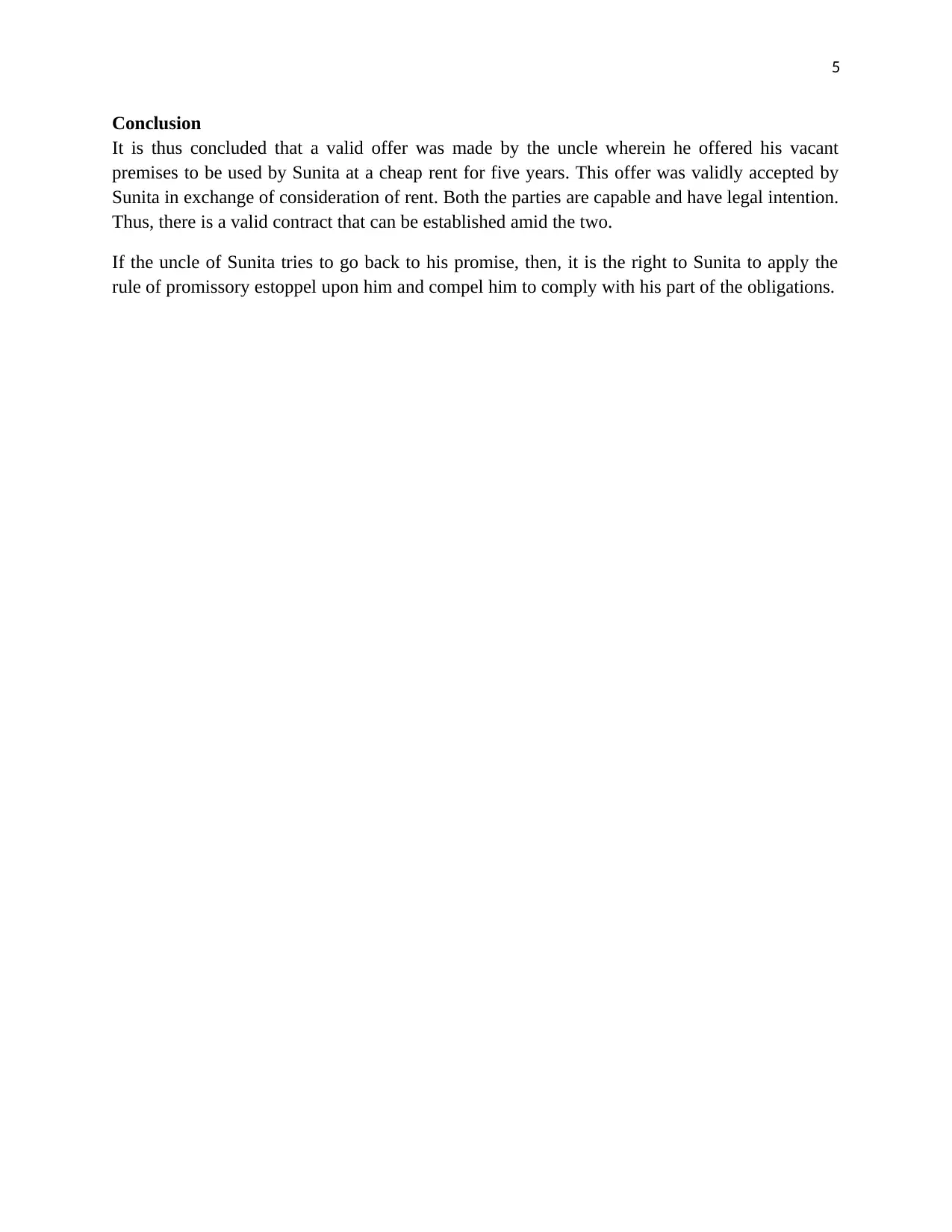
5
Conclusion
It is thus concluded that a valid offer was made by the uncle wherein he offered his vacant
premises to be used by Sunita at a cheap rent for five years. This offer was validly accepted by
Sunita in exchange of consideration of rent. Both the parties are capable and have legal intention.
Thus, there is a valid contract that can be established amid the two.
If the uncle of Sunita tries to go back to his promise, then, it is the right to Sunita to apply the
rule of promissory estoppel upon him and compel him to comply with his part of the obligations.
Conclusion
It is thus concluded that a valid offer was made by the uncle wherein he offered his vacant
premises to be used by Sunita at a cheap rent for five years. This offer was validly accepted by
Sunita in exchange of consideration of rent. Both the parties are capable and have legal intention.
Thus, there is a valid contract that can be established amid the two.
If the uncle of Sunita tries to go back to his promise, then, it is the right to Sunita to apply the
rule of promissory estoppel upon him and compel him to comply with his part of the obligations.
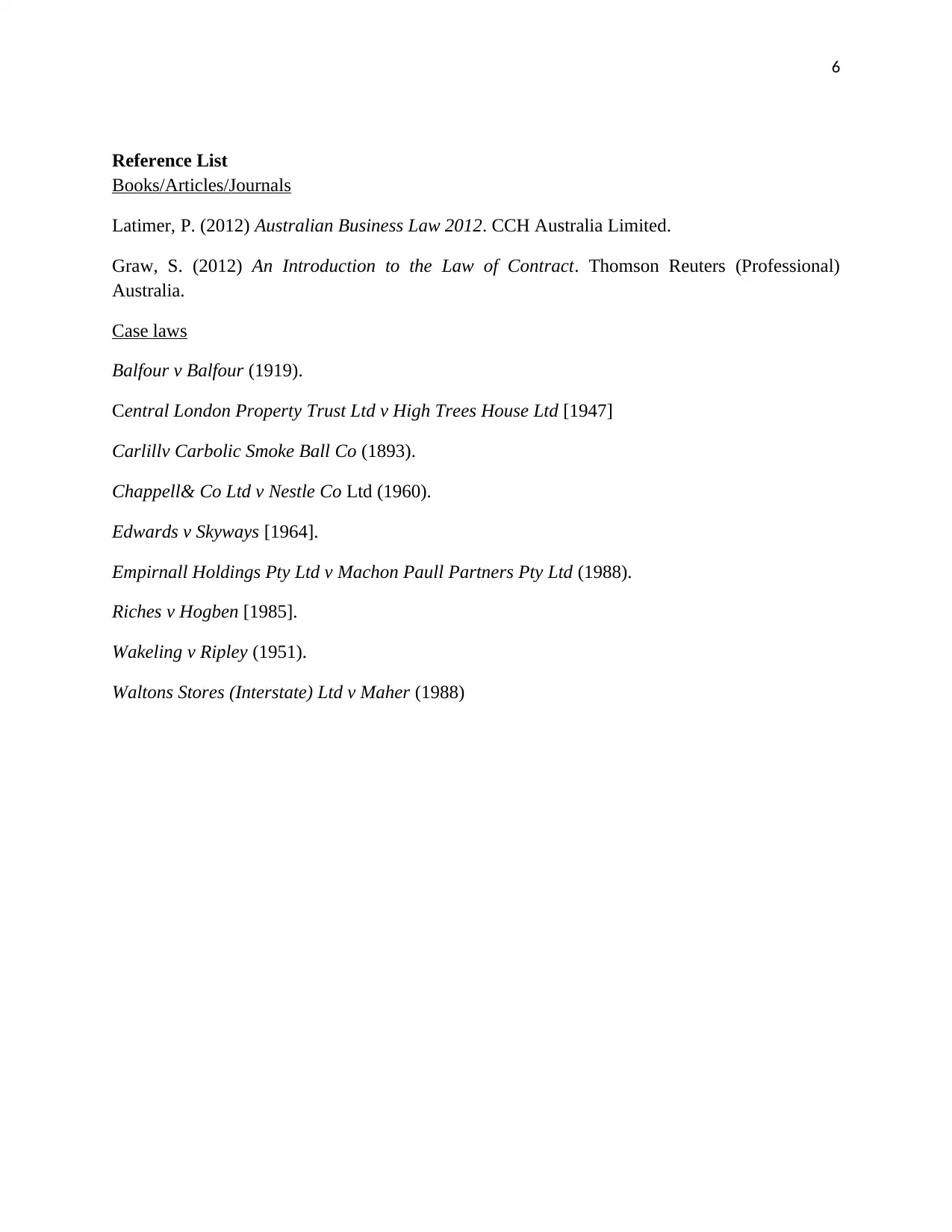
6
Reference List
Books/Articles/Journals
Latimer, P. (2012) Australian Business Law 2012. CCH Australia Limited.
Graw, S. (2012) An Introduction to the Law of Contract. Thomson Reuters (Professional)
Australia.
Case laws
Balfour v Balfour (1919).
Central London Property Trust Ltd v High Trees House Ltd [1947]
Carlillv Carbolic Smoke Ball Co (1893).
Chappell& Co Ltd v Nestle Co Ltd (1960).
Edwards v Skyways [1964].
Empirnall Holdings Pty Ltd v Machon Paull Partners Pty Ltd (1988).
Riches v Hogben [1985].
Wakeling v Ripley (1951).
Waltons Stores (Interstate) Ltd v Maher (1988)
Reference List
Books/Articles/Journals
Latimer, P. (2012) Australian Business Law 2012. CCH Australia Limited.
Graw, S. (2012) An Introduction to the Law of Contract. Thomson Reuters (Professional)
Australia.
Case laws
Balfour v Balfour (1919).
Central London Property Trust Ltd v High Trees House Ltd [1947]
Carlillv Carbolic Smoke Ball Co (1893).
Chappell& Co Ltd v Nestle Co Ltd (1960).
Edwards v Skyways [1964].
Empirnall Holdings Pty Ltd v Machon Paull Partners Pty Ltd (1988).
Riches v Hogben [1985].
Wakeling v Ripley (1951).
Waltons Stores (Interstate) Ltd v Maher (1988)
⊘ This is a preview!⊘
Do you want full access?
Subscribe today to unlock all pages.

Trusted by 1+ million students worldwide
1 out of 6
Related Documents
Your All-in-One AI-Powered Toolkit for Academic Success.
+13062052269
info@desklib.com
Available 24*7 on WhatsApp / Email
![[object Object]](/_next/static/media/star-bottom.7253800d.svg)
Unlock your academic potential
Copyright © 2020–2026 A2Z Services. All Rights Reserved. Developed and managed by ZUCOL.



